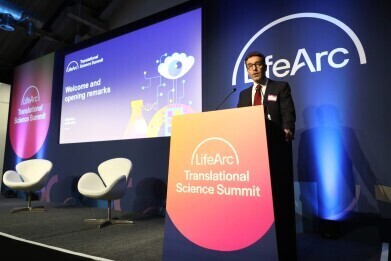-
 Guest Speaker Stephane Maikovsky at the launch of the new centres (Credit: LifeArc)
Guest Speaker Stephane Maikovsky at the launch of the new centres (Credit: LifeArc) -
 Professor Patrick Chinnery gives a presentation (Credit: LifeArc)
Professor Patrick Chinnery gives a presentation (Credit: LifeArc)
News & views
New centres to improve solutions for rare disease patients
May 08 2024
Four new virtual Translational Centres for Rare Diseases launched in the UK with £40 million in funding, are set to tackle barriers that ordinarily prevent new tests and treatments reaching patients, while also speeding up the delivery of rare disease treatment trials. The LifeArc centres will bring together leading scientists and rare disease clinical specialists from across the UK for the first time, encouraging new collaborations across different research disciplines and providing improved access to facilities and training.
Globally, there are said to be more than 300 million people living with rare diseases; research can be fragmented, due to a lack of access to specialist facilities, as well as advice on regulation, trial designs, preclinical regulatory requirements and translational project management. Dr Catriona Crombie, Head of Rare Disease at LifeArc, said: “We’re extremely proud to be launching four new LifeArc Translational Centres for Rare Diseases. Each centre has been awarded funding because it holds real promise for delivering change for people living with rare diseases. These centres also have the potential to create a blueprint for accelerating improvements across other disease areas, including common diseases.”
The £9.4 million LifeArc Centre for Rare Respiratory Diseases, is a partnership between Universities and NHS Trusts across the UK providing, for the first time, a single ‘go to’ centre to connect children and adults with clinical experts, researchers, investors and industry leaders. Led by Professor Kev Dhaliwal, Professor of Healthcare Technology at the University of Edinburgh, Institute for Regeneration and Repair and Honorary Consultant in Respiratory Medicine, NHS Lothian, its aim are to create a UK-wide biobank of patient samples and models of disease that will allow researchers to advance pioneering therapies and engage with industry and regulatory partners. This will significantly boost the capacity and reputation of UK translational medicine, public awareness of the realities of living with rare respiratory diseases, and patient awareness of resources that can improve their quality of life.
The LifeArc-Kidney Research UK Centre for Rare Kidney Diseases, launched in partnership with co-funder Kidney Research UK, will be led by Dr Louise Oni, Senior Lecturer in Paediatric Nephrology at the University of Liverpool and honorary consultant paediatric nephrologist at Alder Hey Children’s Hospital. Rare kidney diseases collectively account for at least 10% of adults with kidney failure and almost all children with kidney failure. They also present a lifelong impact. The new £9.4M centre will unite researchers, patients and healthcare professionals and build on strong established resources, including the national registry of rare kidney diseases (RaDaR), the national renal sample biobank (NURTuRE) and care guidelines. It will begin a transformation in all of the 13 UK children’s kidney centres to embed a culture of research by connecting the systems to accelerate discoveries and advance the treatment of rare kidney diseases. Kidney Research UK is contributing an additional £1m to be used to support the work of the centre over the next five years.
The LifeArc Centre for Rare Mitochondrial Diseases, a national partnership with the Lily Foundation and Muscular Dystrophy UK, will be led by Professor Patrick Chinnery, Professor of Neurology at the University of Cambridge and Honorary Consultant Neurologist at Cambridge University Hospitals NHS Trust and key partners at University College London, Newcastle University and three other centres (Oxford, Birmingham and Manchester). Mitochondrial diseases are genetic disorders often cause progressive damage to the brain, eyes, muscles, heart and liver, leading to severe disability and a shorter life. There is currently have no cure for most conditions; however, new opportunities to treat mitochondrial diseases have been identified in the last five years, meaning that it’s a critical time for research development. The £7.5M centre will establish a national platform that will connect patient groups, knowledge and infrastructure in order to accelerate new treatments getting to clinical trial.
The LifeArc Centre for Acceleration of Rare Disease Trials brings together experts from Newcastle University, Queens University Belfast and University of Birmingham, a partnership that will be coordinated by Professor David Jones, Professor of Liver Immunology at Newcastle University. . Clinical trials for rare diseases are challenging and can be a major limiting step in getting new treatments to patients. Researchers at this £12M centre will create a rare disease trial recruitment portal and design and deliver trials in partnership with patients, speeding up the delivery of clinical trials for people with rare diseases and enable more rapid approval of new therapies for use in the NHS.
More information online
Digital Edition
Lab Asia 31.6 Dec 2024
December 2024
Chromatography Articles - Sustainable chromatography: Embracing software for greener methods Mass Spectrometry & Spectroscopy Articles - Solving industry challenges for phosphorus containi...
View all digital editions
Events
Jan 22 2025 Tokyo, Japan
Jan 22 2025 Birmingham, UK
Jan 25 2025 San Diego, CA, USA
Jan 27 2025 Dubai, UAE
Jan 29 2025 Tokyo, Japan


















